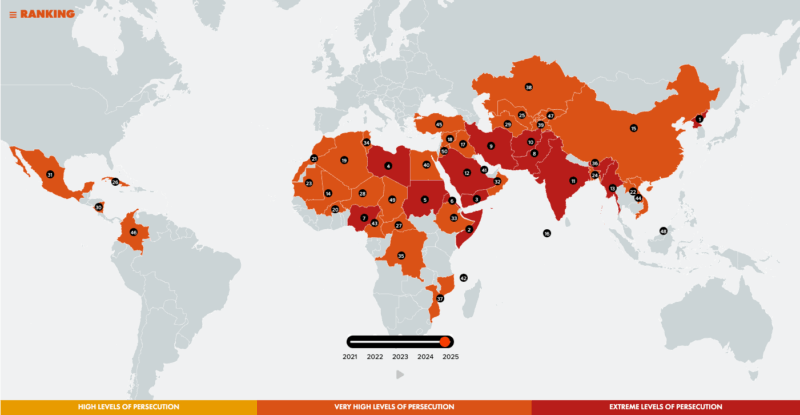
Paul Tuns:
According to Open Doors, a Christian advocacy group, one in seven Christians worldwide suffer persecution or discrimination due to their religious beliefs. The numbers for 2024 are stark.
380 million Christians suffer persecution or discrimination based on their religious beliefs.
50 countries are rated by Open Doors as having “high,” “very high,” or “extreme” persecution and discrimination – 13 are “extreme.”
4476 Christians were murdered for their beliefs.
4744 Christians were imprisoned for their beliefs.
7679 churches and church properties were attacked.
209,771 Christians were forced to leave their homes, go into hiding in-country or leave the country.
One in five Christians in Africa and two in five Christians in Asia suffer persecution or discrimination.
International Christian Concern (ICC) lists Marxism, radical Islam, social and cultural discrimination, and demonic or supernatural evil as the primary drivers of Christian persecution. The 11 countries that have “extreme” persecution or discrimination according to Open Doors are all in Africa and Asia: North Korea, Somalia, Yemen, Libya, Sudan, Eritrea, Nigeria, Pakistan, Iran, Afghanistan, and India. North Korea is a communist country, India is led by Hindu nationalists, and the other nine countries have a majority Muslim population.
Aid to the Church in Need, a Catholic ministry, issued its 2025 global “Religious Freedom Report” on Oct. 22, analyzing 196 countries and finding serious violations of persecution in 24 of them and discrimination in 38. Two-thirds of the world’s population live in countries with serious violations of religious freedom. The situation is getting worse for Christians. In only two of the 196 countries is the situation showing improvement compared to last year: Kazakhstan and Sri Lanka.
According to its report, Islamist extremism is expanding across Africa and Asia and is the main driver of the persecuted Church. In 15 countries, it is the main cause of persecution, and in another 10, it contributes to discrimination.
Red China is also a persistent threat to religious freedom, requiring churches to follow communist orthodoxy. There are official state-sanctioned churches but also a thriving network of underground “house churches.” Voice of the Martyrs states, “If church leaders refuse to join the government-controlled church, false charges are filed against them” and “It is also illegal to teach religion to anyone younger than 18 years of age, even if those teaching them are their own parents.”
Voice of the Martyrs reported last month that beginning on Oct. 9, “Chinese authorities began a coordinated campaign against (Beijing Zion Church) and its leaders,” with “As many as 30 pastors and associates, including Pastor Jin Mingri, have been taken into custody.”
While no western countries – Canada and the United States, Europe, Australia and New Zealand, and Japan – make the list of the worst offenders for either Open Doors or Aid to the Church in Need when it comes to persecution and discrimination, there is still cause for concerns in many of those nations.
According to Aid to the Church in Need Canada report released Oct. 21, raises concerns about the rise in violence and acts of intolerance in Canada. Between 2021 and 2024, 33 churches were set on fire with 24 confirmed as criminal acts. The report also flags the lack of freedom of conscience for healthcare workers or faith-based institutions in relation to euthanasia. In Quebec, the policy of laicity opposes any religious expression in the public square.
The U.S. Napa Legal Institute issued its religious freedom index last month. Rating states on six factors including state constitutional protections for the free exercise of religion, religious freedom for non-profits with public programming, religious freedom for faith-based employers, and protections for religious exercises during a state of emergency, the Napa Institute found only five states with a grade of 60 per cent or better: Alabama, Kansas, Mississippi, Georgia, and Florida, with only Kansas getting a grade above 80. More than half (26) states had a grade below 40 per cent. Both Republican and Democrat-controlled states made the bottom of the list. The worst offenders were Michigan, Vermont, Delaware, Maryland, and Hawaii, all with grades below 30 per cent.
The International Day of Prayer (IDOP) for the persecuted church falls on the first Sunday of each November. The 2025 theme is “Unite in Prayer” and in Canada IDOP is promoted by the Evangelical Fellowship of Canada, Intercede International, International Christian Response Canada, Open Doors Canada, Take Heart, and Voice of the Martyrs.




